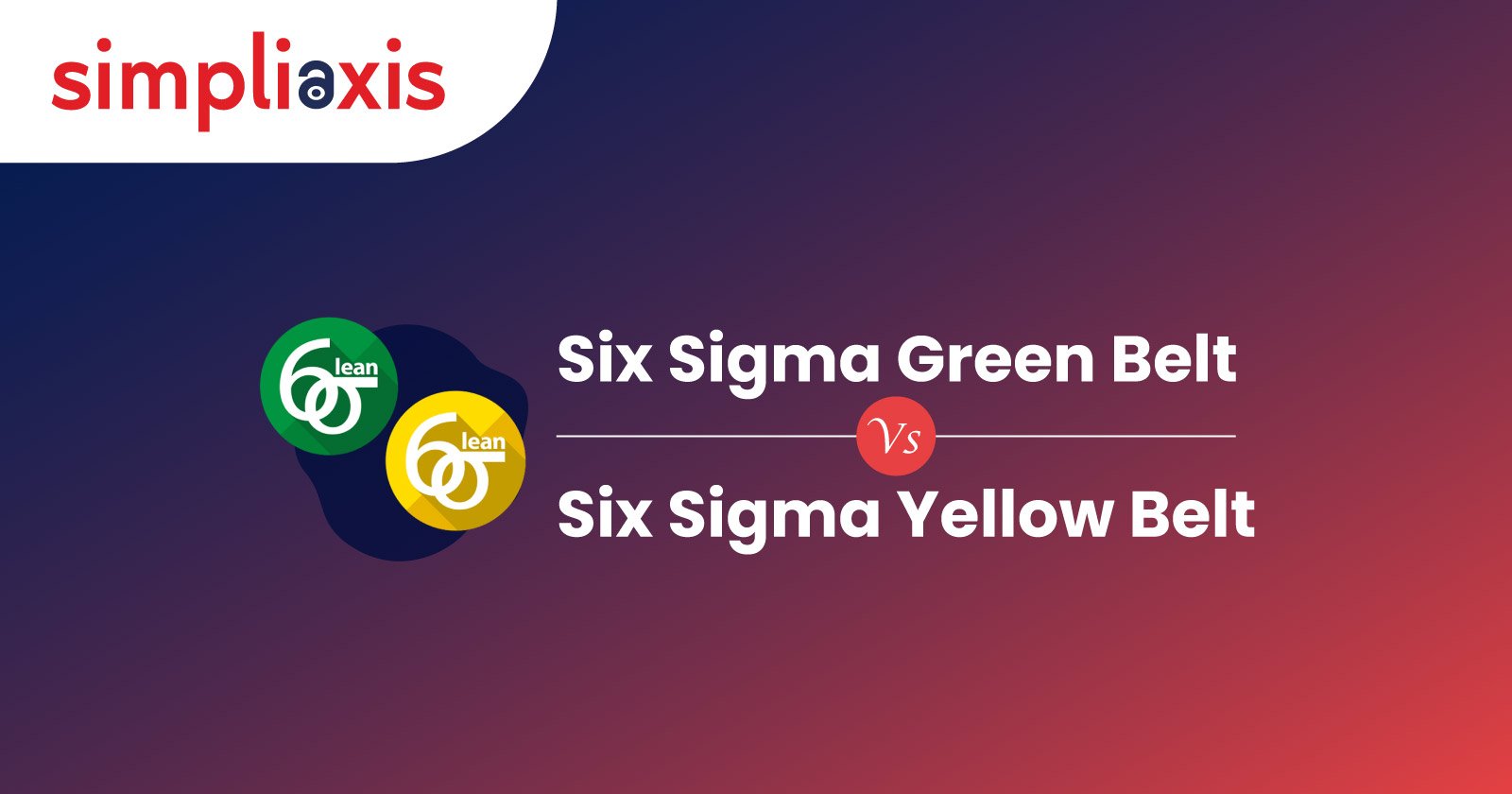Six Sigma methodologies play a pivotal role in enhancing organizational efficiency and effectiveness in the realm of quality management and process improvement. Among the various Six Sigma certification levels, Green Belt and Yellow Belt are crucial tiers, each offering unique skill sets and responsibilities. Understanding the differences between Six Sigma Green Belt and Yellow Belt certifications is essential for individuals seeking to advance their careers in quality management.
In this blog, we will explore the definitions, roles, responsibilities, key differences, and suitability of these two certifications to help you make informed decisions about your professional development.
Definition of Six Sigma Green Belt & Six Sigma Yellow Belt
Before delving into the intricacies of each certification, let's define what Six Sigma Green Belt and Yellow Belt certifications entail:
- Six Sigma Green Belt: This certification signifies proficiency in Six Sigma methodologies and tools, allowing professionals to lead process improvement projects within their organizations. Six Sigma Green Belts are typically tasked with analyzing data, Identifying the underlying causes of issues and implementing effective solutions to enhance processes and reduce defects.
- Six Sigma Yellow Belt: Six Sigma Yellow Belt certification serves as an introduction to Six Sigma principles and techniques. Yellow Belts are equipped with basic knowledge of Six Sigma concepts and often play a supportive role in process improvement projects led by Green Belts or higher-level professionals.
Ready to take your career in quality management to the next level? Enroll in our Six Sigma Green Belt or Yellow Belt courses today and become a certified expert in process improvement!
Also, Check:What is Six Sigma
Roles and Responsibilities of Six Sigma Green Belt and Yellow Belt
Aspect | Green Belt Responsibilities | Yellow Belt Responsibilities |
Project Leadership | Lead process improvement projects | Provide support in process improvement projects |
Data Analysis | Analyze data to identify root causes of problems | Assist in data collection and basic analysis |
Process Improvement | Implement solutions to enhance processes and reduce defects | Support implementation of process improvements |
Team Management | Lead project teams and collaborate with stakeholders | Participate in project teams and provide input |
Continuous Improvement | Drive continuous improvement initiatives within the organization | Contribute to continuous improvement efforts within their scope |
Key Differences between Six Sigma Green Belt and Yellow Belt based on Skills and Qualifications:
Aspect | Green Belt Skills and Qualifications | Yellow Belt Skills and Qualifications |
Knowledge Level | In-depth understanding of Six Sigma methodologies and tools | Basic understanding of Six Sigma concepts and techniques |
Project Leadership | Capable of leading process improvement projects | Limited leadership role, usually supporting Green Belts or higher-level roles |
Data Analysis | Proficient in data analysis techniques and statistical tools | Basic knowledge of data analysis, with a focus on simple analysis techniques |
Problem-Solving | Skilled in identifying root causes of problems and implementing solutions | Limited problem-solving role, assisting in identifying and addressing issues |
Certification Requirements | Typically requires completion of Green Belt training and passing an exam | Requires completion of Yellow Belt training and passing an exam |
Also, CheckSteps to Implement Six Sigma
Which Belt Certification is Most Suitable for You?
Choosing between Six Sigma Green Belt and Yellow Belt certifications depends on your career goals, current skill level, and level of commitment to Six Sigma methodologies. Consider the following factors when making your decision:
- Experience: Green Belt certification may be more suitable if you have prior experience in quality management or process improvement and aspire to take on leadership roles in Six Sigma projects.
- Skill Level: If you are new to Six Sigma and seeking an introduction to its principles and techniques, Yellow Belt certification can provide a solid foundation.
- Career Path: Assess your long-term career goals and determine how Six Sigma certification aligns with your aspirations. Green Belt certification may offer more opportunities for advancement and higher-level roles within organizations.
- Commitment: Consider your level of commitment to Six Sigma training and certification. Green Belt certification typically requires more extensive training and dedication compared to Yellow Belt certification.
Also, check:Difference Between Yellow, Green, Black Belt Six Sigma
Lastly!
Both Six Sigma Green Belt and Yellow Belt certifications offer valuable opportunities for individuals looking to enhance their quality management and process improvement skills. Whether you choose to pursue Green Belt certification for advanced leadership roles or Yellow Belt certification for a foundational understanding of Six Sigma principles, Simpliaxis offers professional courses tailored to your needs.
Take the next step in your career journey with Simpliaxis and unlock new professional growth and development opportunities. Simpliaxis offers professional courses in Six Sigma Green Belt, Yellow Belt, and other related fields. Visit our website today to discover our comprehensive. Training programs to elevate your career to greater heights!
FAQs
Q. Is a yellow belt in Six Sigma worth it?
For many, the Lean Six Sigma Yellow Belt program serves as an entry point into the realm of process improvement. Obtaining the Six Sigma Yellow Belt certification is highly valuable, especially for team leaders and members tasked with addressing localized team-based challenges.
Q. Which is a higher Six Sigma Green belt or Black Belt?
Two primary categories of Six Sigma certification exist: Green Belt and Black Belt. Green Belts are practitioners involved in improvement projects overseen by Black Belts, while Black Belts serve as experts leading projects and guiding Green Belts.
Q. Is Yellow Belt exam easy?
Passing a Six Sigma Yellow Belt certification is no simple feat. The exams are rigorous, requiring significant effort to pass. Furthermore, progressing from one level to the next demands years of hands-on practical training.
Q. Can I start with Six Sigma Green belt?
Certainly! Getting a Six Sigma Green Belt certification is feasible even without prior experience. Numerous training providers offer tailored Green Belt courses specifically designed for individuals who are new to Six Sigma or process improvement methodologies.













 +1-361-998-9988
+1-361-998-9988


